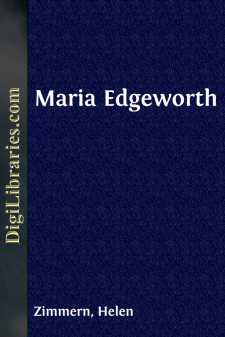Categories
- Antiques & Collectibles 13
- Architecture 36
- Art 48
- Bibles 22
- Biography & Autobiography 813
- Body, Mind & Spirit 142
- Business & Economics 28
- Children's Books 17
- Children's Fiction 14
- Computers 4
- Cooking 94
- Crafts & Hobbies 4
- Drama 346
- Education 46
- Family & Relationships 57
- Fiction 11829
- Games 19
- Gardening 17
- Health & Fitness 34
- History 1377
- House & Home 1
- Humor 147
- Juvenile Fiction 1873
- Juvenile Nonfiction 202
- Language Arts & Disciplines 88
- Law 16
- Literary Collections 686
- Literary Criticism 179
- Mathematics 13
- Medical 41
- Music 40
- Nature 179
- Non-Classifiable 1768
- Performing Arts 7
- Periodicals 1453
- Philosophy 64
- Photography 2
- Poetry 896
- Political Science 203
- Psychology 42
- Reference 154
- Religion 513
- Science 126
- Self-Help 84
- Social Science 81
- Sports & Recreation 34
- Study Aids 3
- Technology & Engineering 59
- Transportation 23
- Travel 463
- True Crime 29
Maria Edgeworth
by: Helen Zimmern
Description:
Excerpt
CHAPTER I.
INTRODUCTORY.
Too many memoirs begin with tradition; to trace a subject ab ovo seems to have a fatal attraction for the human mind. It is not needful to retrace so far in speaking of Miss Edgeworth; but, for a right understanding of her life and social position, it is necessary to say some words about her ancestry. Of her family and descent she might well be proud, if ancestry alone, apart from the question whether those ancestors of themselves merit the admiration of their descendants, be a legitimate source of pride. The Edgeworths, originally established, it is believed, at Edgeworth, now Edgeware, in Middlesex, would appear to have settled in Ireland in the sixteenth century. The earliest of whom we have historical record is Roger Edgeworth, a monk, who followed in the footsteps of his sovereign, Henry VIII., both by being a defender of the faith and by succumbing to the bright eyes of beauty, for whose sake he finally renounced Catholicism and married. His sons, Edward and Francis; went to Ireland. The elder brother, Edward, became Bishop of Down and Connor, and died without issue. It was the younger, Francis, who founded the house of Edgeworth of Edgeworthstown; and ever since Edgeworthstown, in the county of Longford, Ireland, has remained in the possession of the family whence it derived its name. The Edgeworths soon became one of the most powerful families in the district, and experienced their full share of the perils and vicissitudes of the stormy period that apparently ended with the victories of William III. Most members of the family seem to have been gay and extravagant, living in alternate affluence and distress, and several of Maria Edgeworth's characters of Irish squires are derived from her ancestors. The family continued Protestant—the famous Abbé Edgeworth was a convert—and Maria Edgeworth's great-grandfather was so zealous in the reformed cause as to earn for himself the sobriquet of "Protestant Frank." His son married a Welsh lady, who became the mother of Richard Lovell Edgeworth, a man who will always be remembered as the father of his daughter. He was, however, something more than this; and as the lives of the father and daughter were throughout so intimately interwoven, a brief account of his career is needful for a comprehension of hers.
Richard Lovell Edgeworth was born at Bath in 1744, and spent his early years partly in England, partly in Ireland, receiving a careful education. In his youth he was known as "a gay philosopher," in the days when the word philosopher was still used in its true sense of a lover of wisdom. Light-hearted and gay, good-humored and self-complacent; possessed of an active and cultivated mind, just and fearless, but troubled with neither loftiness nor depth of feeling, Richard Lovell Edgeworth was nevertheless a remarkable personage, when the time at which he lived is taken into account. He foresaw much of the progress our own century has made, clearly indicated some of its features, and actually achieved for agriculture and industry a multitude of inventions, modest as far as the glory of the world attaches to them, but none the less useful for the services they render. Many of his ideas, rejected as visionary and impracticable when he first promulgated them, have now become the common property of mankind. He was no mere theorist; when he had established a theory he loved to put it into practice, and as his theories ranged over many and wide fields, so did his experiments. Even in late life, when most persons care only to cultivate repose, he threw himself, with all the ardor of youth, into schemes of improvement for the good of Ireland; for he was sincerely devoted to her true welfare, and held in contempt the mock patriotism that looks only to popularity. In early life he sowed a certain quantity of wild oats, the result of the super-abundant animal spirits that distinguished him, and at the age of sixteen contracted a mock-marriage, which his father found needful to have annulled by a process of law....


